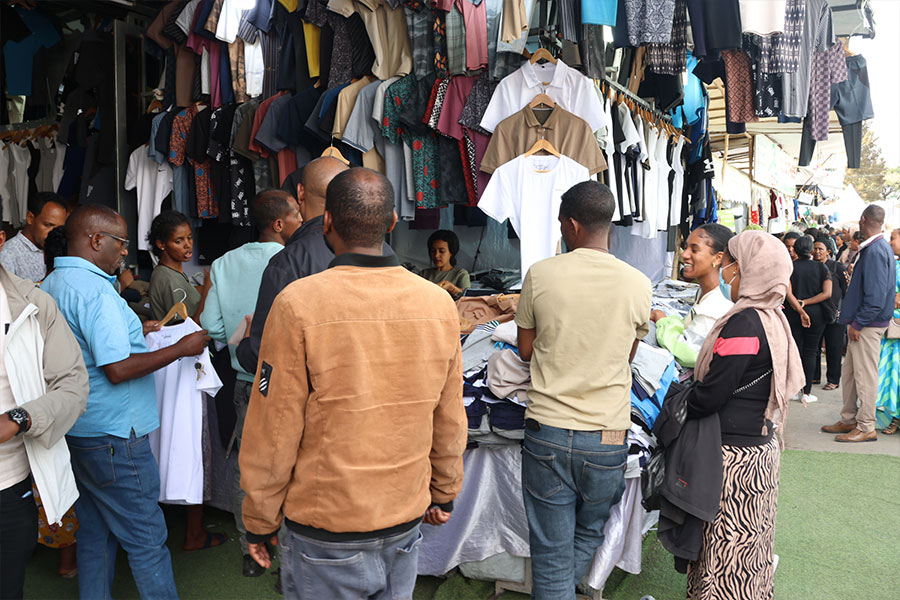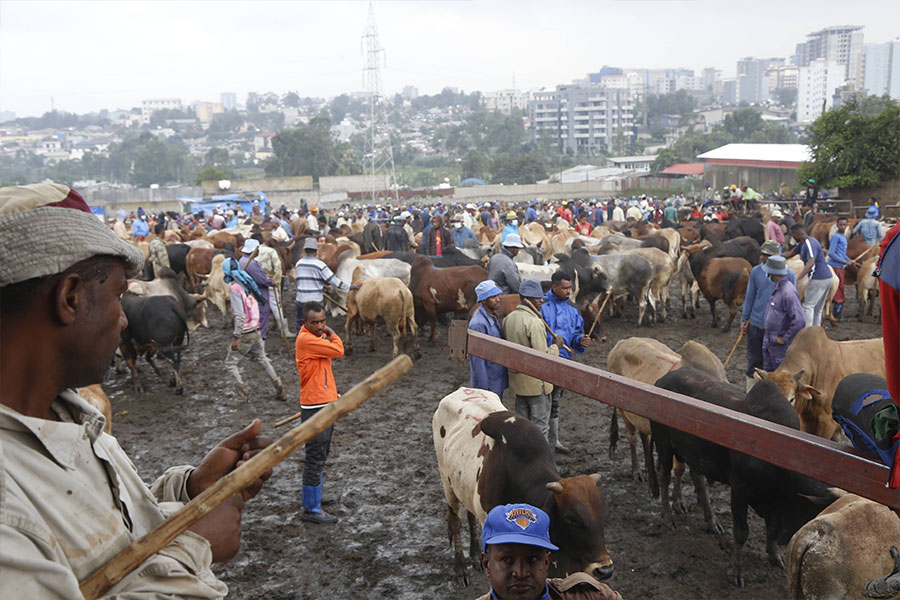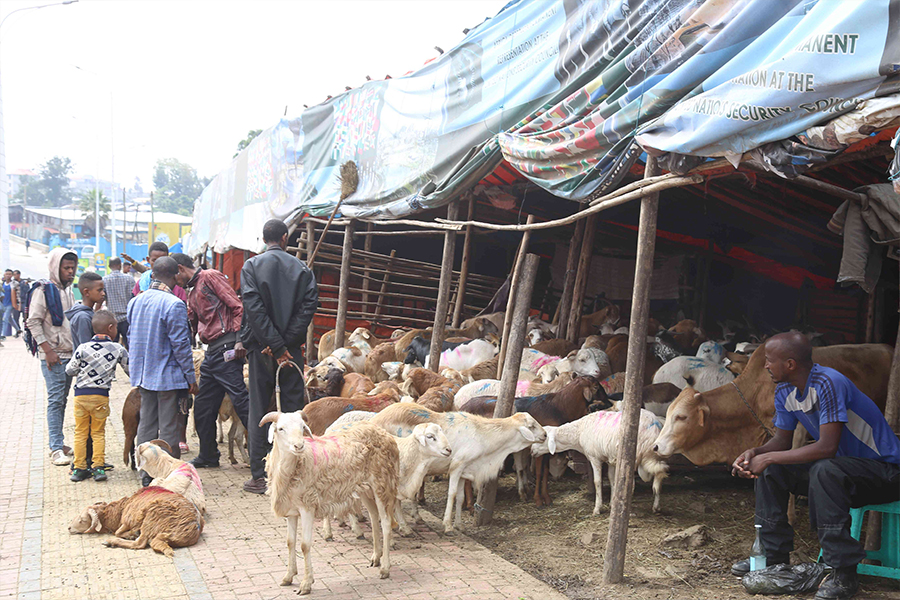
Featured | Apr 19,2025
It is a well-known tale: Santa Claus also known as Saint Nicholas or Kris Kringle has a deep history engraved in Christmas traditions. His story goes back to the third century when Saint Nicholas strolled the earth to become the upholder of gifts on Christmas.
To this day his image is sketched in the minds of people as the merry man who brings gifts to good people on Christmas Eve.
Saron Daniel, an ardent Ethiopian-American follower of the Christmas tradition, arrived at Villa Verde for the Baz-unch! event to buy gifts for her family members on December 18, 2019.
It is more like a tradition to Saron, who turns 30 this Christmas and has been buying presents for her family every year for most of her life.
She was not new to the event. Last year she gave her mother a whole set of African print jewels that she bought from the same occasion at Villa Verde.
“You can’t find these kinds of handmade and unique designs from ordinary shops,” said Saron, a student of Afro-American Studies at Howard University who is currently in Ethiopia for the holiday.
Of the 4,000 Br she plans to spend on gifts for this holiday season, she estimates 70pc will be spent at these kinds of small bazaars where she admits to snagging good deals and enjoying the thrill of hunting for presents.
Saron is part of a growing community of artsy millennials who search out these types of products for their holiday shopping list.
Baz-unch! is a monthly event that incorporates the term bazaar and brunch held at the famous Italian restaurant, Villa Verde, where the Mediterranean cuisine comes together with live music and entertainment.
Afro Fair Fest was organised for the third time at the Tropical Garden.
Organised by Villa Verde, the holiday edition of Baz-unch! held on December 16, 2019, featured live music by The Cover, an Ethiopian indie music band, and Caribbean cuisine served by the restaurant.
There were 25 vendors selling products like African print clothing, arts, handmade accessories, leather products and crafts that took part in the event.
One of the participants, Haymanot Honlegne, a 25-year-old model who founded Hamek Designs has been an enthusiastic attendee of these kinds of bazaars for close to three years.
Hamek Designs is a company that specialises in making fashionable jewels using African prints and handicraft works for home décor. The sole owner, Haymanot has been in the business for around four years at the same times as she grows her modelling career.
She rented her kiosk for 1,500 Br for the two-day event, where she earned close to 5,000 Br.
“Things are changing, especially among young people who try to be self-sufficient and want to be part of a circular economy,” said Haymanot. “Although most of my customers are the ex-pat community living in Ethiopia, there has been an increasing interest from locals.”
Her products can be identified by their bright colourful African prints posted on earrings, notebooks and cardboard boxes. The prices of the products range from 100 Br for the earrings to 600 Br for the cardboard boxes.
Another exhibition for handmade artefacts was held at Tropical Garden. Dubbed the Afro Fair Festival, it was held before the other Christmas bazaars on December 1, 2019.
The event hosts small locally manufactured products like leather products, textile products, home décor materials, artworks and jewelry.
The event is organised by Sabegn Ethiopia, Rofe Advertising and BlackRhino Fashion for the third time. It hosted 110 vendors, double the participants who took part in the first event held at Mosaic Hotel back in 2018.
The event was attended by more than 1,500 people, according to Abraham Meressa, strategic manager of Sabegn Ethiopia.
This event showcased the work of another entrepreneur, Yiddiya Damtew, creator and manager of Sheba Socks, who previously worked on business development for the multi-national company General Electric.
Sheba Socks Plc is the first Ethiopian sock brand that draws its raw material from bamboo plants designed with Ethiopian Tillet patterns that were officially launched in 2018.
The company is also working in partnership with the Woman for Climate and International Network for Bamboo & Rattan, which assisted on the startup with market research, mentorship and product research, while the Tony Elumelu Foundation is one of the financial partners, according to Yididiya.
“Currently, we are in the market with the prototype of the product,” said Yididiya. “However, we've not started mass production yet."
The raw materials are currently imported from Europe, and the products, which sell for 850 Br a pack, contain three socks made for men.
Sheba Socks have participated in bazaars such as the Alliance Ethio-Francaise’s Christmas market dubbed “La Village”, the Baz-unch! event and the Fendika Night market.
“These kinds of bazaars have helped us to get direct customer feedback, design comments, and set our price range,” adds Yididiya. “It also creates a platform to find a segment of the specific community that appreciates the products.”
The company is also working toward launching products like Sheba thread, cushions, carpets and blankets.
Another aspiring participant in this event, Lulit’s Hand Woven Fashion & Home Accessories, which was established in 2013, was co-founded by Lulit Sahel-Micheal and Sofonias Samson.
Lulit’s showcased its clothes that are made from cotton dyed in plant pigments. The products are woven by both machine or hand. It imports nylon and threads from Italy to create unique cloths, according to Sofonias.
The company, which took part in Artisan Bazaar, Anbar and African Mosaic events, also produces wall art, tabletop covers, curtains and cushion covers.
“Our products are quite sensitive and intimate, making them time-consuming to create,” said Sofonias.
The challenge of being in this business is mainly providing training for the weavers on the correct ways of weaving, dyeing, and finishing the products, because the process needs perfection, which consumes time, according to Sofonias.
Currently, there are 14 employees at their workshop located in Legetafo behind Central Hotel.
The prices for products such as scarves range from 500 Br to 700 Br and women's tops and men's shirts cost between 1,800 Br to 2,200 Br. The Big Gabi, a handmade cotton cloth worn over the shoulders and upper body, is sold for 2,500 Br and the small Gabi can be purchased for between 800 Br to 1,000 Br.
The main objective of exhibitions and bazaars in Ethiopia is to sell items rather than introduce, promote and demonstrate products, according to Mulugeta GeberMedhine (PhD), assistant professor at the Addis Abeba University College of Commerce.
“These kinds of showcasing events will help small scale companies build their business, as well as experience and take a step further into their respective fields,” he said.
PUBLISHED ON
Jan 05,2020 [ VOL
20 , NO
1028]

Featured | Apr 19,2025

News Analysis | Sep 10,2021

Agenda | Sep 10,2022

Radar | Sep 02,2023

Commentaries | May 15,2021

Dec 22 , 2024 . By TIZITA SHEWAFERAW
Charged with transforming colossal state-owned enterprises into modern and competitiv...

Aug 18 , 2024 . By AKSAH ITALO
Although predictable Yonas Zerihun's job in the ride-hailing service is not immune to...

Jul 28 , 2024 . By TIZITA SHEWAFERAW
Unhabitual, perhaps too many, Samuel Gebreyohannes, 38, used to occasionally enjoy a couple of beers at breakfast. However, he recently swit...

Jul 13 , 2024 . By AKSAH ITALO
Investors who rely on tractors, trucks, and field vehicles for commuting, transporting commodities, and f...

Jul 5 , 2025
Six years ago, Ethiopia was the darling of international liberal commentators. A year...

Jun 28 , 2025
Meseret Damtie, the assertive auditor general, has never been shy about naming names...

Jun 21 , 2025
A well-worn adage says, “Budget is not destiny, but it is direction.” Examining t...

Jun 14 , 2025
Yet again, the Horn of Africa is bracing for trouble. A region already frayed by wars...